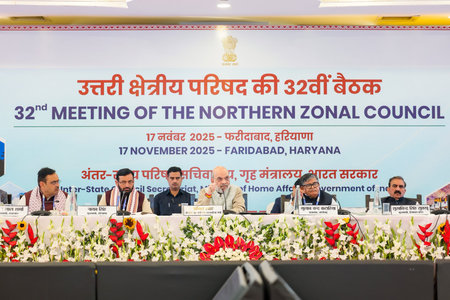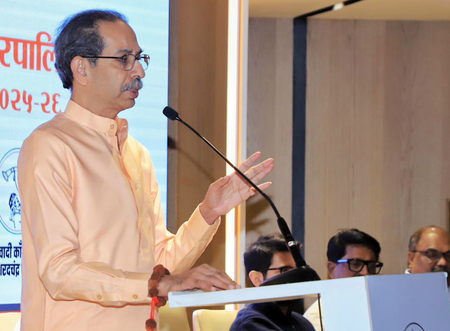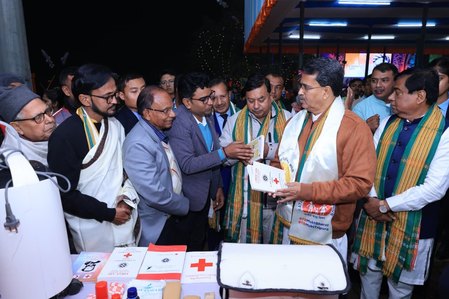
Faridabad, Nov 17 (IANS) Union Home Minister Amit Shah on Monday told northern states to continue all-out efforts to ensure speedy justice in crimes against women and children and also eradicate malnutrition and stunting.
Chairing the 32nd meeting of the Northern Zonal Council (NZC) in Faridabad, HM Shah laid stress on speedy investigation in cases of sexual offences and rape under the POCSO Act against women and children.
HM Shah said that no civilised society can accept such heinous crimes.
He said that the safety of women and children is our top priority; for this, the number of Fast Track Special Courts (FTSC) should be increased.
HM Shah said that the sectors of cooperation, agriculture and fisheries can become important means of eradicating poverty and providing employment.
He said that poverty is being eradicated and employment is increasing through cooperation, agriculture, and fisheries.
Referring to Prime Minister Narendra Modi’s mantra of “Sahkar Se Samriddhi” (Prosperity through Cooperation), HM Shah said that the cooperative sector holds immense potential for employment.
He said that only through employment growth — especially self-employment — along with Gross Domestic Product, can we realise the dream of a Developed India.
He said that GDP alone is not an indicator of a country’s prosperity; true prosperity is achieved only when every individual rises above the poverty line.
He said that the Government of India’s Ministry of Cooperation has initiated 57 measures across the country to strengthen the cooperative sector.
These include computerisation of Primary Agricultural Credit Societies (PACS), establishment of three new national-level cooperative societies, and the setting up of Tribhuvan Sahkari University.
In today’s meeting, along with issues of the member states, several extremely important national issues were also discussed, which included the implementation of Fast Track Special Courts (FTSCs) for speedy investigation and prompt disposal of rape cases against women and children, availability of brick-and-mortar banking within the designated radius of every village, issues related to water sharing, environment, higher education, etc., the Emergency Response Support System (ERSS-112), and other matters of common interest at the regional level.
In addition, six issues of national importance were included in the agenda, which are: urban master planning, power supply system, strengthening of Primary Agricultural Credit Societies (PACSs), eliminating malnutrition in children through the ‘Poshan Abhiyan’, reducing school dropout rates, and participation of public hospitals in the Ayushman Bharat-Pradhan Mantri Jan Arogya Yojana.
The Union Home Minister said that the energetic land of Surajkund is not only historic but also a living testimony to rich cultural and artistic heritage and economic consciousness.
The land of Surajkund and the example of Lord Suryanarayan’s Bhagirath-like efforts inspire us. It was here that Lord Krishna himself first uttered the Shrimad Bhagavad Gita with his divine mouth, and evidence of the ancient civilisation of the Indus Valley has also been found here.
HM Shah said that Haryana and Punjab are the land of the great Sikh Gurus, who not only contributed to strengthening the country’s spiritual consciousness but also made immense sacrifices for the country’s honour and freedom.
“Today, our country is moving forward based on its original traditions, but had Guru Tegh Bahadur Ji not been there, the country would not be moving based on its original traditions today.”
He said that the great sacrifice of Guru Tegh Bahadur Ji and the sacrifice of the Tenth Guru gave the country great strength and showed the path of struggle.
HM Shah said that the original spirit and role of Zonal Councils is advisory, but in the last decade, they have been accepted as action-oriented platforms and have delivered results.
He said that with follow-up, we have not only accepted issues between states, between regions and states, and between the Centre and state governments, but also created concrete pathways for their resolution.
HM Shah said that our goal is clear — Regional Strength along with National Progress and India’s Global Leadership in every field, which will lead us towards the creation of a Great India.
The Home Minister said that all states should work in mutual coordination to resolve water resource management and water-related problems.
The meeting was attended by Haryana Chief Minister Nayab Singh Saini, Punjab Chief Minister Bhagwant Mann, Himachal Pradesh Chief Minister Sukhvinder Singh Sukhu, Rajasthan Chief Minister Bhajan Lal Sharma, Jammu and Kashmir Chief Minister Omar Abdullah, Delhi Chief Minister Rekha Gupta, Administrator of the Union Territory of Chandigarh Gulab Chand Kataria, Lieutenant Governor of Jammu and Kashmir Manoj Sinha, Lieutenant Governor of Delhi Vinai Kumar Saxena, and Lieutenant Governor of Ladakh Kavinder Gupta, along with senior ministers and officials from these States and Union Territories.
–IANS
rch/dan




